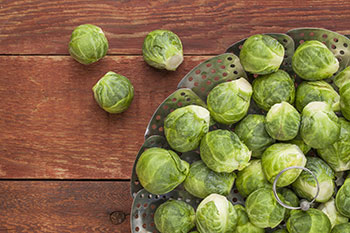
Description & Health Benefits
- Member of Cruciferae (cabbage) family which also includes broccoli, cabbage, cauliflower, collards, kale, radish, rutabaga and turnip among others.
- A great source of vitamin K, vitamin C, and folate (folic acid) and naturally low in calories. Vitamin K promotes normal blood clotting. Vitamin C is important in wound healing, immune health and assists in the absorption of iron. Folate is important for women of child bearing years to reduce the risk of neural tube defects.
- Glucosinolate, a natural component of Brussels sprouts and other vegetables in the cruciferous family, has been associated with a decreased risk of cancer, including lung, stomach, and colon cancers.
- To receive these benefits, it is essential to eat cruciferous vegetables such as Brussels sprouts regularly. Some research recommends five servings per week, but at this time specific guidelines do not exist.
Selecting, Storing & Preparing
- Choose Brussels sprouts that are firm and green. Avoid those with yellow leaves and soft texture. Purchase on the stalk when available. Choose Brussels sprouts of equal size to ensure even cooking.
- Store in a plastic bag, uncut and unwashed, in the refrigerator. Will keep up to one week.
- Prepare by removing outer leaves, cut off stem and discard. Prepare by steaming, boiling, roasting or sautéing. Do not overcook which results in a strong sulfur odor and a mushy texture.
Brussels Sprout Nutrition Facts
1 cup cooked
Calories: 56 | Protein: 3.98g | Fat: 0.78g | Carbohydrate: 11.08g | Fiber: 4.1g| Sugars: 2.71g | Calcium: 56mg | Magnesium: 31mg | Potassium: 495mg | Vitamin C: 96.7mg | Folate: 94μg | Vitamin A: 1209IU | Vitamin K: 218.9μg
Brussels Sprout Recipes
Request an Appointment
